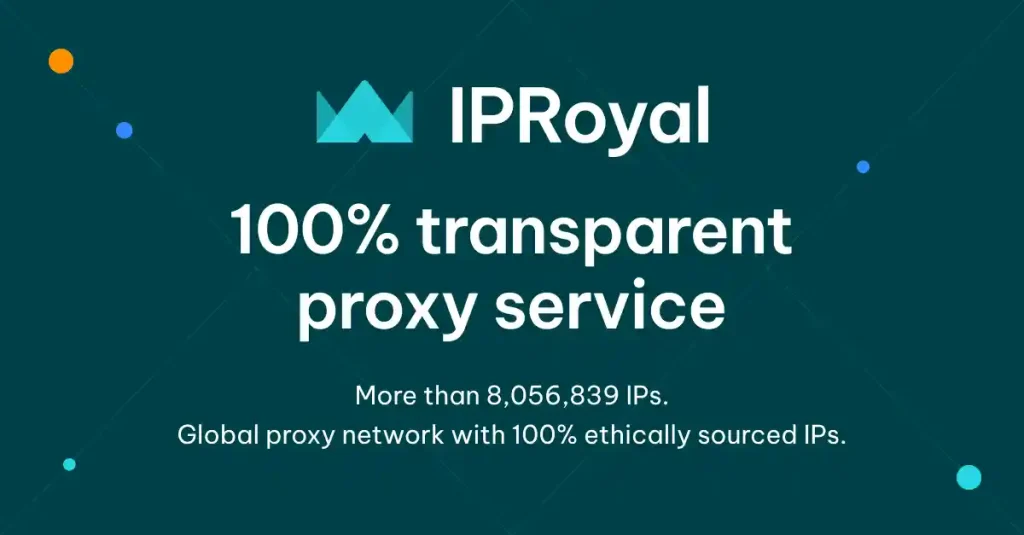IPRoyal carves a niche in the proxy industry by offering a range of residential, datacenter, and mobile proxies. This analysis takes a deep dive into IPRoyal proxy capabilities, empowering proxy users and decision-makers to navigate the intricate landscape of proxy providers.
IPRoyal boasts a global network exceeding 1.5 million IPs across a noteworthy number of countries. While not the most extensive network compared to some competitors, IPRoyal emphasizes affordability and ethically-sourced proxies.
They claim their residential proxies originate from real internet service providers (ISPs), potentially offering a higher level of anonymity and bypassing geo-restrictions more effectively.
However, independent verification regarding the specific ISPs and their distribution is unavailable.
Beyond residential options, IPRoyal offers datacenter and mobile proxies, catering to a wider range of use cases. Notably, their datacenter proxies are advertised as unlimited bandwidth, potentially appealing to users requiring high-volume data transfer.
IPRoyal caters to users with varying budgets. They offer a unique pay-as-you-go model alongside traditional subscription plans. This flexibility can be advantageous for users with sporadic proxy needs or those who prefer to avoid upfront commitments. However, it’s important to note that per-gigabyte pricing can become less cost-effective for high-volume users compared to traditional subscription plans.
Performance is a crucial factor for proxy users. IPRoyal doesn’t disclose official uptime guarantees, but user reviews generally suggest a reliable service. Connection speeds can vary depending on chosen location and network congestion. Bandwidth limitations depend on the chosen plan, with upgrade options available for increased throughput.
Security is paramount for proxy users. IPRoyal utilizes industry-standard encryption protocols to safeguard data transmission. However, for users demanding the most stringent security measures, it’s advisable to consult with IPRoyal regarding their specific security practices and compliance certifications.
IPRoyal offers basic features like user authentication and session management. Notably absent are some advanced features offered by competitors. Geo-targeting at the city level for residential proxies might be limited, and real-time IP rotation is not explicitly mentioned. These limitations might be a dealbreaker for users requiring precise control over their proxy experience or maximum anonymity.
Strengths:
Affordability and flexible pricing: IPRoyal’s pay-as-you-go model and tiered subscription plans cater to users with varying budgets. This flexibility allows for cost-effective solutions for both casual and high-volume users depending on the chosen plan.
Ethically-sourced residential proxies: IPRoyal emphasizes ethical sourcing of their residential proxies. This might appeal to users concerned about the ethical implications of proxy use.
Unlimited bandwidth datacenter proxies: Datacenter proxies with unlimited bandwidth can be a significant advantage for users requiring high-volume data transfer, such as web scraping or large file downloads.
Weaknesses:
Limited network size: While respectable, IPRoyal’s network size pales in comparison to some competitors. This might restrict the availability of specific IP locations for some users.
Pay-as-you-go pricing for high-volume users: While the pay-as-you-go model offers flexibility, it can become less cost-effective for users requiring a high volume of proxies compared to traditional subscription plans.
Limited advanced features: IPRoyal lacks some advanced features becoming increasingly common amongst proxy providers. The absence of granular geo-targeting for residential proxies and real-time IP rotation can be a drawback for users requiring highly specific location targeting or maximum anonymity.
If you’re on a tight budget and only need a proxy occasionally, IPRoyal’s pay-as-you-go model is a great fit. It’s also a good option if you care about where your proxies come from. But if you need a massive network, tons of features, or the absolute cheapest price for high-volume use, there might be a better choice out there.
Ultimately, a well-informed decision depends on individual needs and budget constraints.

